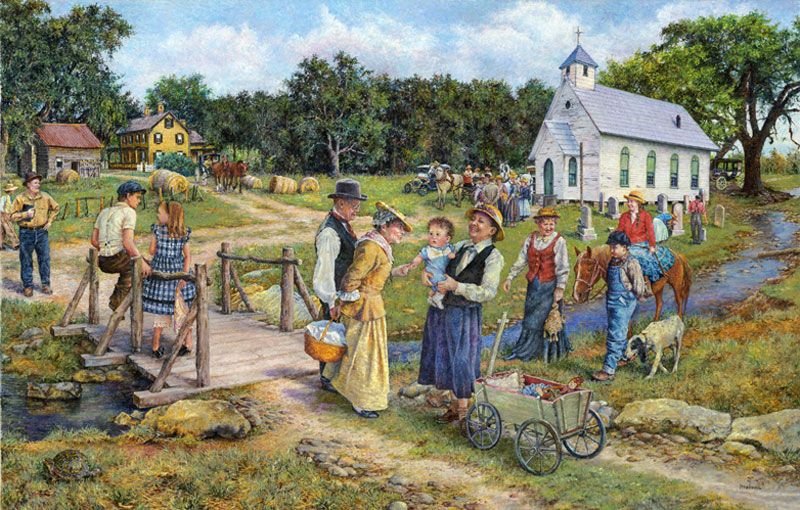|
I heard a sermon recently where the preacher reminded his congregation that we live in a post-industrial world where the extended family has lost much of its practical relevance and necessity. That until recently and stretching back into the mist of time we humans lived in what may be thought of as extended families, tight knit communities, or tribes. If you’ll enter into your imagination for a spell and imagine your life and the world around you were we to cease to have electricity or the combustion engine, you’ll begin to see what he was getting at. Our lives would quickly begin to resemble those of our ancestors from let’s say roughly 1900 and before. This would include not just the supreme importance of immediate family with its bonds of intense sacrificial love, but also the reemergence of the importance of the extended family with all of its bounds of sentiment, shared values, and practical value. Having to return to the speed of walking or horse, and thus unable to travel long distances quickly, the geographic space in which we live would shrink dramatically. One result of this would be that our actual dwellings would once again become centres of production, childcare, and education, as well as our hospitals and nursing homes, as they had been since the beginning of time. If country music is an indicator of longing then there may be a part of us that is drawn to what we imagine as a simpler time. Agrarianism is alive and well after all, but it remains a subculture, and there are few who choose to live it. The truth is that our great-grandmothers bought that electric stove the minute they could, as well as dozens of other gadgets that have radically reduced woman’s work. We gave up gardening when we didn’t have to garden. Likewise our horses and wagons. Thanks to the ongoing Scientific Revolution of the 17th Century and the Industrial Revolution of the 18th Century, we have now become so prosperous that famine has lost its place of honour in our collective nightmares. Not even our best story tellers in cinema can frighten us with it as we munch on a quarter bushel of popcorn. Attendant with and allowed by this great prosperity, and buoyed by mankind’s innate desire to have as much as possible in exchange for as little as possible, the modern welfare state has emerged. It has not just liberated man from famine, it has liberated woman from man, the old from the young, and driven the last nail in the coffin in our old tribal traditions. But by having lost tribe on which we were so dependent and to which owed loyalty and service, have we lost anything of meaning? If we are in fact but individuals, then no. The tribe was just a social construct born of necessity. Unless it wasn’t. Unless the tribe was and is in fact as much a product of human existence as the family itself. Unless the tribe, like the family, provides some needful function other than just the practical. This piece was published on Look Away on Dec. 8, 2022.
2 Comments
|
AuthorMark Atkins has six wee bairns who are all seventh-generation Henry County, Tennessee, and all from the same doe. It is the people of Henry County that he most wants to reach but writes to Southerners generally. He is without credentials but rather dares to speak by the same authority as the little boy who cried 'The king has no clothes!' His core belief and starting point is that like everything, we humans have a nature, it is not so hard to understand, and to pretend that it is other than it is, is to jump off a cliff. Which is what we Americans have in fact done. Archives
October 2023
|

